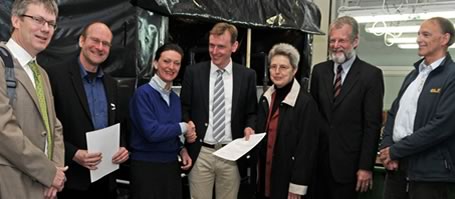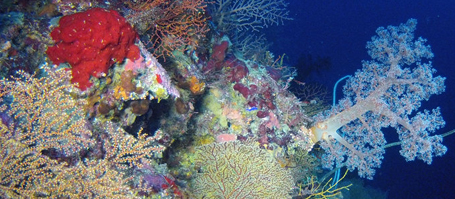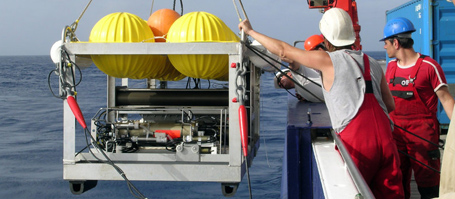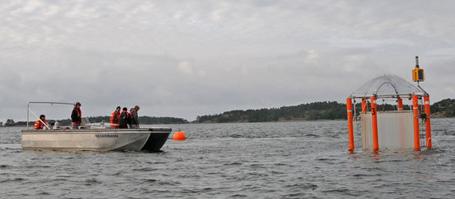Dr. Cordelia Andreßen, State Secretary for Science, presented the corresponding notifications of funding to Prof. Carsten Schulz, scientific director of the Association for Marine Aquaculture (GMA) in Büsum, and to Prof.Dr. Thorsten Reusch, Head of the research area “Marine Ecology” at GEOMAR | Helmholtz Centre for Ocean Research Kiel.
The project FINE-Aqua, which is being carried out in cooperation between the GEOMAR | Helmholtz Centre for Ocean Research Kiel and Christian Albrechts University Kiel (CAU), comprises three subprojects including recognition and prevention of fish diseases, the optimization of quality feed and the improvement of immune competence in fish larvae. The Ministry of Economic Affairs is providing 745,000 Euros over a period of three years for the project, which has a total budget of 1.08 million Euros.
The goal of the project, which is being supported by the Association for Marine Aquaculture, is the establishment of a competence network in aquaculture that will link the interests of science with those of business and generate projects on the scientific and economic development of aquaculture on national and European levels. Schleswig-Holstein is providing 202,000 Euros for the first three years for the establishment of the network, with total costs of approximately 289,000 Euros.
“I am pleased that the new Helmholtz Centre GEOMAR will play a greater part in aquaculture research with FINE-Aqua” Andreßen said. According to the State Secretary, a better understanding of fish diseases and alternatives to fish meal as feed – two topics of the proposed FINE-Aqua research – is essential for the success of aquaculture.
According to Andreßen, it is just as important to establish a central and coordinated position for aquaculture research. She also confirmed Schleswig-Holstein’s continued support of the GMA in its development as a national competence center for marine aquaculture.
Prof. Dr. Peter Herzig, Director of GEOMAR explained: “With the FINE-Aqua project we will continue the successful collaboration in this area with the CAU and other partners in Schleswig-Holstein”. Aquaculture is, according to Herzig, one of GEOMAR’s four application-oriented research areas.
The term aquaculture is understood to mean all water-based systems used in the production of organisms in aquatic life forms such as microalgae, fungi, clams, shrimps, fish, etc, their tissues, cells or cell fragments.
“The further development of aquaculture promises great prospects for halting the overfishing of the world’s oceans and for exploiting new, climate-friendly food sources. Thus, on the one hand, we need to find an alternative to fish meal; on the other hand we need to increase the profitability of fish farming. FINE-Aqua and the Academy for Interdisciplinary Marine Science in Kiel are good instruments for reaching both goals” added Prof. Dr. Dr. h.c. Thomas Bosch, CAU’s vice president of research.
Aquaculture is carrying the hopes of many for a protein supply in a world with an ever growing population and gradually emptying seas. With a growth rate of about 10 percent per year, aquaculture is the fastest growing sector of the food industry. Nonetheless there is also criticism, as aquaculture sites can cause considerable damage to the environment. Firstly, fish in aquaculture are usually still being fed with fish meal, which is obtained by wild catching. Secondly, changes in nutrient levels in the environment have a significant effect, especially in seas where fish and crustaceans are kept in net cages. Thirdly, fish diseases present a high economic risk to the operators.
With the new European Fisheries Fund for 2014, the European Union is committing explicitly to aquaculture and expects that the member states will develop national aquaculture strategies.
More Informationen:
- www.gma-buesum.de
Association for Marine Aquaculture (GMA) in Büsum - nemo.aquaculturebase.de
The previous project NEMO (Sustainable Feeding with marine Organisms)
more photographic material:
www.geomar.de/news/article/gesunde-fische-und-ein-netzwerk-fuer-die-aquakultur
Contact:
Prof. Dr. Thorsten Reusch, Tel.: 0431 600-4550, treusch@geomar.de
Maike Nicolai (Communication and Media), Tel.: 0431 600-2807, mnicolai@geomar.de
…



